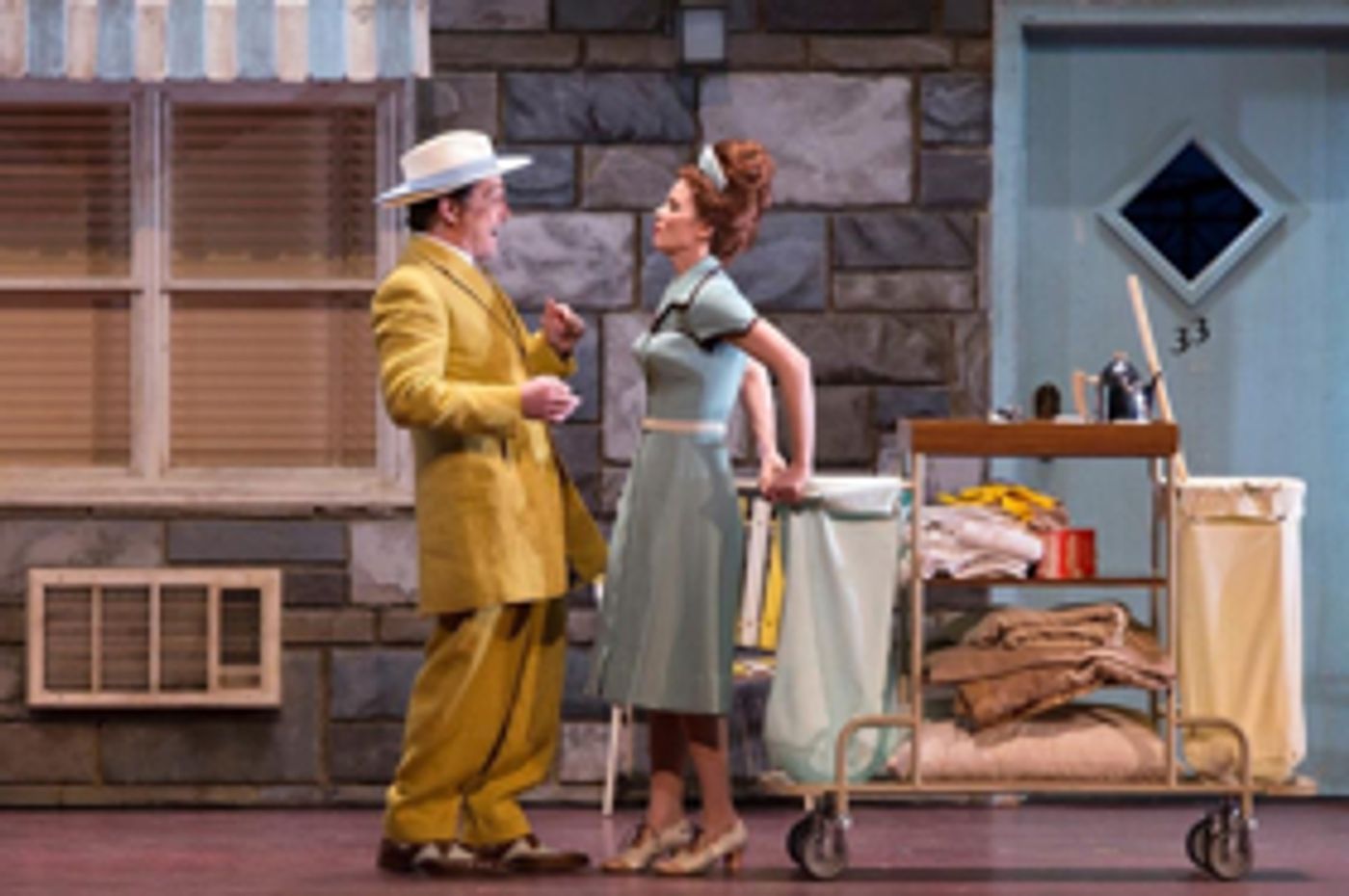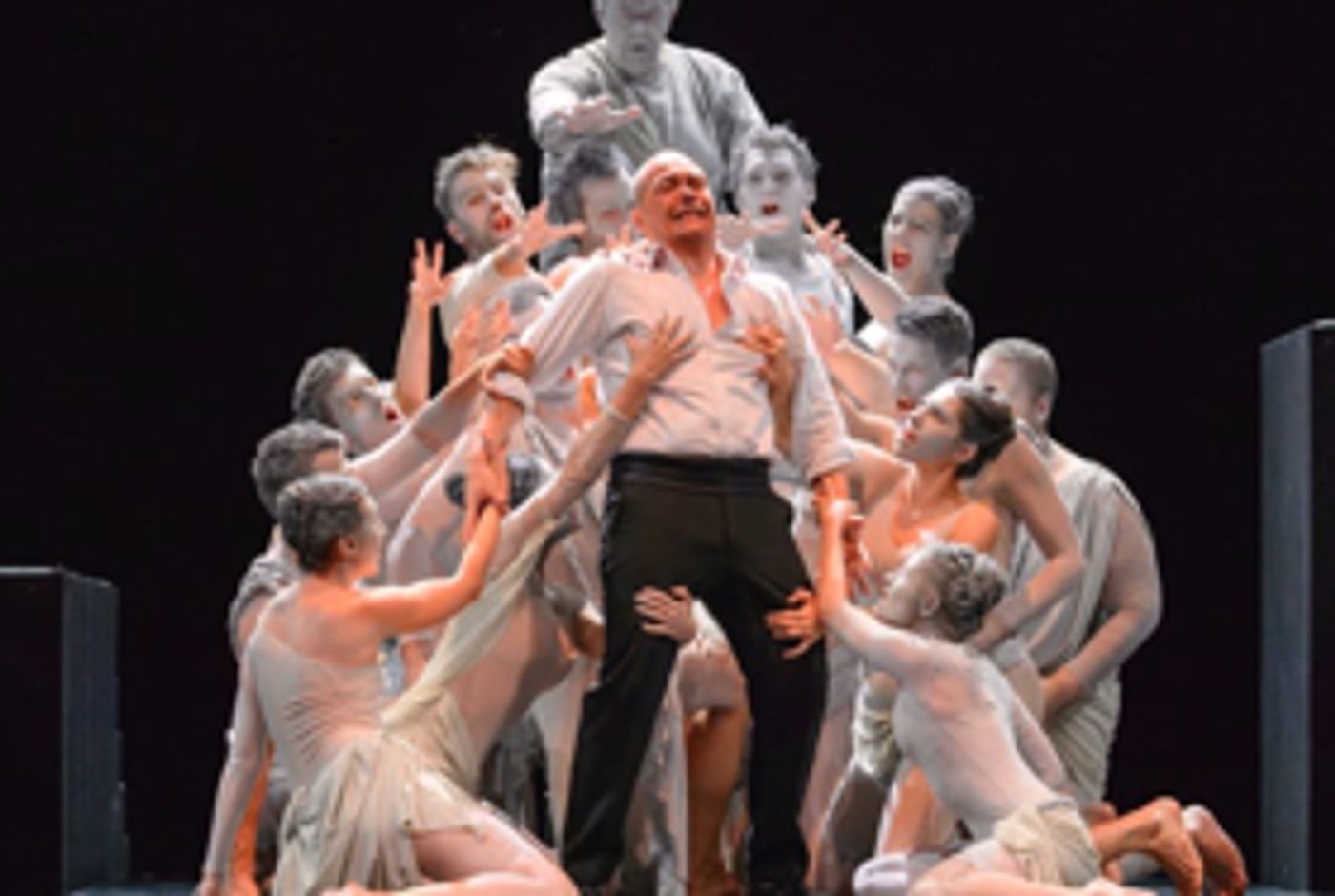Interview: Baritones Are Like That, Says Christopher Maltman of the Met's COSI FAN TUTTE

Photo: Paola Kudacki/Metropolitan Opera
"My goal at the moment is to sound like a dead Italian," says British baritone Christopher Maltman, who stars as Don Alfonso with Broadway's Kelli O'Hara as Despina, co-conspirators against young lovers in the Met's new production of Mozart's comedy COSI FAN TUTTE. "Or, at least, to sound like a 'live' dead Italian."
What does that mean? For opera-lovers, that might refer to a multi-layered, abundant voice, exceptional singing technique and breath control, elegant phrasing and, for good measure, great acting chops--or, at least, as many of those virtues as a singer can muster at one time. (For Maltman, it could be like Piero Cappuccilli or Ettore Bastianini, baritone idols of his.)

Met audiences--and those attending the company's Live in HD broadcasts in 73 countries--will be able to judge for themselves how Maltman fits the bill during the run of COSI FAN TUTTE (commonly translated as WOMEN ARE LIKE THAT) between March 15 and April 19. But if past performance is any indication, they should be very pleased indeed.
Maltman, whose repertoire runs from Handel's GIULIO CESARE (1724) to Thomas Ades's THE TEMPEST (2004) and adds Nico Muhly's new MARNIE next season at the Met, is perhaps best known for his Mozart (though that may change in the near future). Specifically, it's his portrayal of the title character in DON GIOVANNI (including a film adaptation, JUAN, with opera director Kasper Holten), that's brought him the greatest acclaim. (He did it at New York's Mostly Mozart Festival in 2017.)

Photo: Marty Sohl/Metropolitan Opera
He has also done many Papagenos in DIE ZAUBERFLOTE (THE MAGIC FLUTE) and lots of COSIs as well, though mostly in a different role than his current assignment. His portrayal of Alfonso, in fact, is a relatively recent addition to Maltman's repertoire but one he feels is "one of those rites of passage for all baritones--when you move on from being the young love interest" (Gugliemo, which he has sung many, many times) "into the juicier character role." It's particularly juicy in Phelim McDermott's production set in the 1950s carnival world--they say Coney Island, but one foreign to most New Yorkers--conducted by David Robertson.
And Maltman has found rehearsals "quite a ride" with this very different take on the traditional story, in which two young men test the fidelity of their fiancees, by disguising themselves as foreigners, all the while being manipulated by a pair of ne'er-do-wells (Alfonso and Despina, his cohort). "The idea here is to set it in a kind of world where reality breaks down a touch--a world of fantasy, where people let their guard down a little bit and indulge in directions they wouldn't go in their everyday life. Hence, they are susceptible to not recognizing their lovers when they come back in costume."
Testing fidelity? Tricking fiancees? Is this the most cynical opera that, not just Mozart, but anybody ever wrote? I ask him. He agrees--but also hedges.

Photo Credit: Richard Termine
"Absolutely. It's a very cynical look at love, whether in the traditional production or this new one," says Maltman. "It's an interesting piece because of the three da Ponte-Mozart collaborations"--the others being DON GIOVANNI and LE NOZZE DI FIGARO--"it lacks GIOVANNI's moral, judgment, where we are told what is the right and wrong way to behave." [And Giovanni goes to hell at the end]. "And it lacks the class revolution aspect of FIGARO. But COSI is very much more lightweight; the story of six people and how they act. As such, it's the best of these operas to be ripe for transplanting into another time period and I think the drama survives very, very well.
"It's really the subsidiary characters--Alfonso and Despina--who are running the show. Particularly in this version, where Don Alfonso is the nightclub owner, who has his finger in every pie; he pays the 'carnies'--our team includes an amazing bunch of real Coney Island-type performers: a strongman who can lift opera singers with his teeth, a snake charmer who performs with a Burmese python, a fire-eater and a sword-swallower. And they're all in my pocket. I'm Oberon" [referring to the King of the fairies in A MIDSUMMER NIGHT'S DREAM] "and they're my subjects."
"We as outsiders see the cynicism of the piece, the manipulation involved, but all of the six characters they only see their point of view and that's honest." He explains his approach to doing this oily character: "When I play a role like this, I look at it from the character's perspective--not from any exterior judgment but from his own view of what is happening. For me, Alfonso has some private wound that he needs to indulge here in the most misguided way.
"While we might see it one way, I believe, for him, it's almost evangelical--that he has to educate these kids, show them there's no such thing as fidelity. He has to pare them back to the bedrock and then say, look you can build from here, but don't start building castles in the air because they don't exist. So, for whatever reason he feels that he has to do this, he must manipulate them--and Despina as well."
In this production, he finds Alfonso both kinder and more cruel than usual. "In the other production I did as Alfonso, he was more of this bumbling, benign figure in the background, who was just trying to teach these young boys a lesson. But here it's all tied up with his relationship with Despina--we had this idea that they were con artists in a previous life, grifting, working marks and doing little setups, e.g., 'let's make some money by doing the one where we prove the truth about fidelity.' And it's me trying to drag her back into my world to win her back.
"Yes, from an exterior point of view, I think it's deeply cynical and in 2018, we come across all kinds of problems with the relationships, especially regarding the absolutely correct #MeToo movement, this focus on the abuse of--and the empowerment of--women. In the opera, we have a situation where the misogyny is awful: Alfonso says to the boys, look, you can't trust women. It's absolutely terrible, but I think you can flip that on its head and put the judgment very much on the behavior of Alfonso and the boys," he continues. "The boys, okay, fine fair enough, they're jealous as only young lovers can be--desperate to prove themselves right, that their partners are faithful. But Alfonso's deep cynicism and his lack of care for them is quite shocking at times, that he's absolutely willing to put them through this mill--including Despina, who doesn't know the total story of what's going on and has her own journey."
As you can tell, Maltman takes what might be called a "method acting" approach to the characters he portrays--giving himself over to a role so he emotionally identifies with it--a kind of Stanislavsky view taken by actors like Marlon Brando and others from the Actor's Studio in New York.
In fact, four or five years ago, he recalls, that approach caused some problems. "I threw myself so deeply into the acting side of things that sometimes, vocally, I slipped a little and was guilty of not being as careful with my instrument, my voice, as I should have been."
Luckily, he realized that he needed to be proactive about the care of his voice as he began looking at a more dramatic repertoire, like the operas of Verdi. He has already done a few of these--including the title role in SIMON BOCCANEGRA, along with the major baritone roles in LES VEPRES SICILIENNES and DON CARLO. But when I asked, "If you had to choose one role you'd like to sing before you die, it would be ..." he answered without hesitation: Rigoletto.
"I can never think about that opera without getting all emotional," he admits. "The music is absolutely fantastic, but also Rigoletto for me is the perfect balance between acting and singing. The very greatest 'Rigoletti' [he laughs] should be perfectly poised between those two things because you can have someone who sings it fantastically but unless you have a real actor in the role, the music isn't 'weaponized.'
Enter: a vocal coach (and, coincidentally, now girlfriend) Audrey Saint-Gil, a pianist and conductor who has been on the conducting staff at the LA Opera and Washington National Opera and on the music staff of the Academy of Vocal Arts in Philadelphia. "When we first got together, she told me she loved my voice but thought there were things wrong with it...which I of course found difficult to hear," he recalls.
"I think that being a singer--or performer of any kind--is a very difficult balancing act because you have to have self-confidence and be convinced in your mind that you have something to give. At the same time, that has to be balanced with humility and self-awareness.
"Audrey told me I had the voice to do all this Verdi--but that it wasn't in the right shape to do them at that time," he recalls. "She said I needed to refocus and reposition it. This has meant lots of hard work with her over the past two years, working together on all these roles and developing my Italian style--and never let it slip," he says.
And that work has paid dividends, as Maltman has a RIGOLETTO on his schedule and is "champing at the bit" to do it. "Yes, I could have sung the role before working with Audrey-- but there's no way I would have felt that I did it justice. This performance is looming large at the moment and it's something I never thought I would sing.
"Let's face it, anybody who thinks he is the finished article is lost, as far as I'm concerned, because it's a constant labor of love to both refine your artistic sensibility and also your instrument,' Maltman says. "I think about it over and over again, every single day."
Videos

